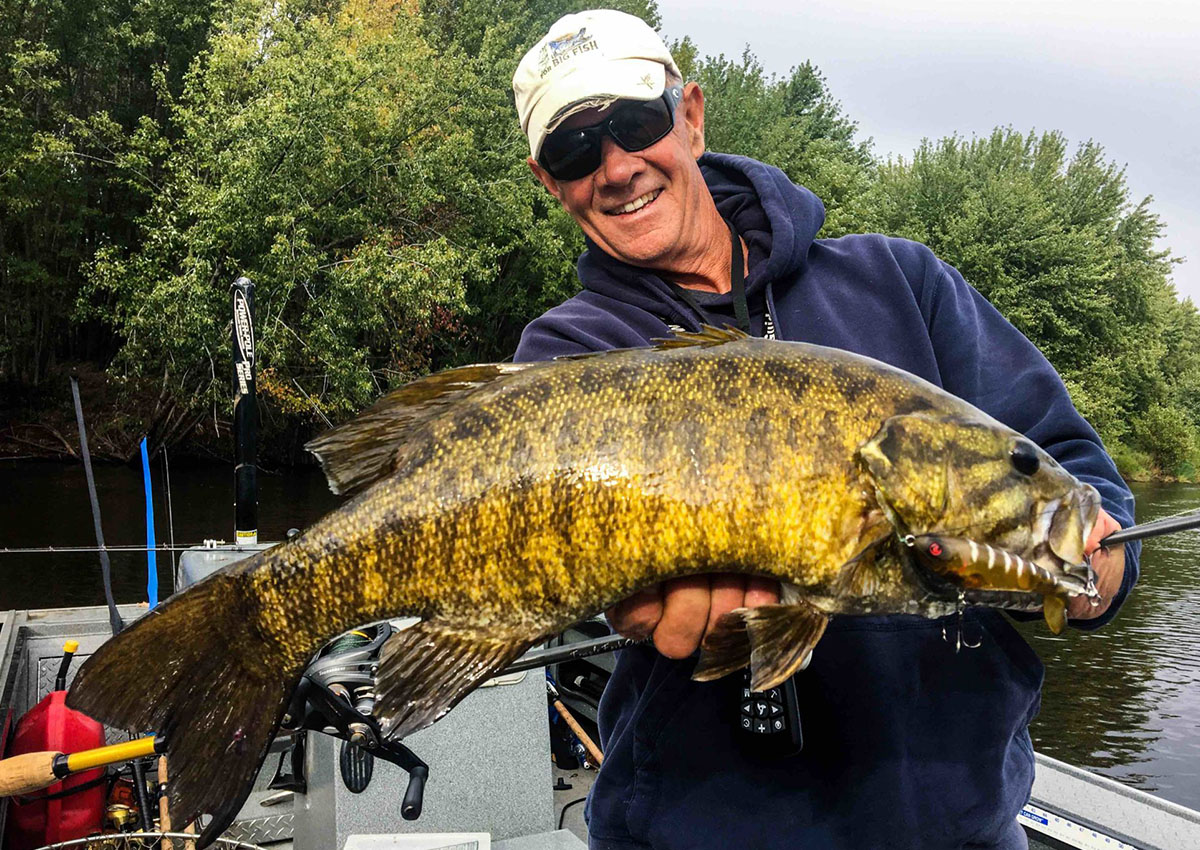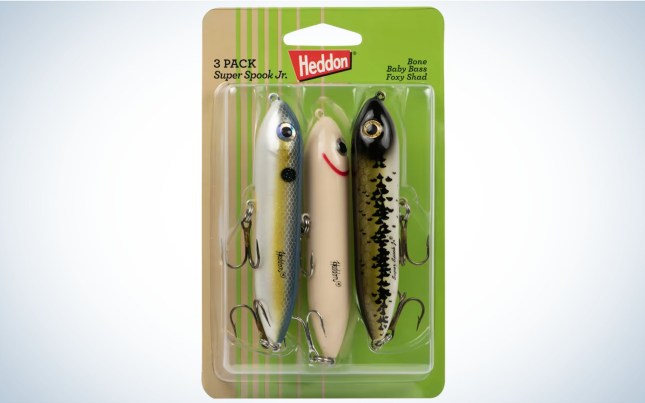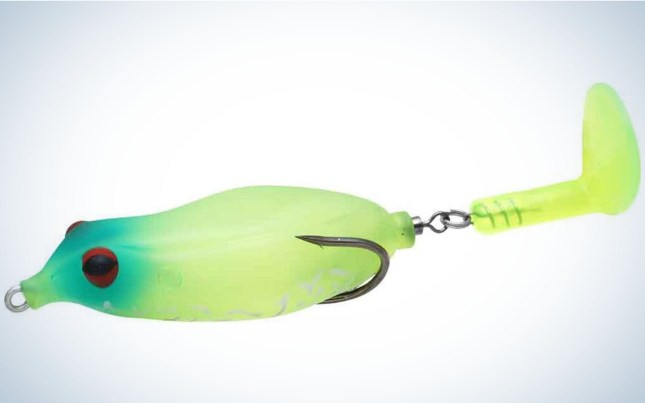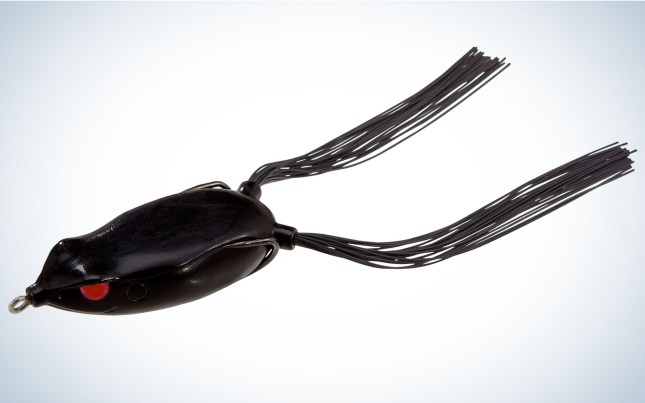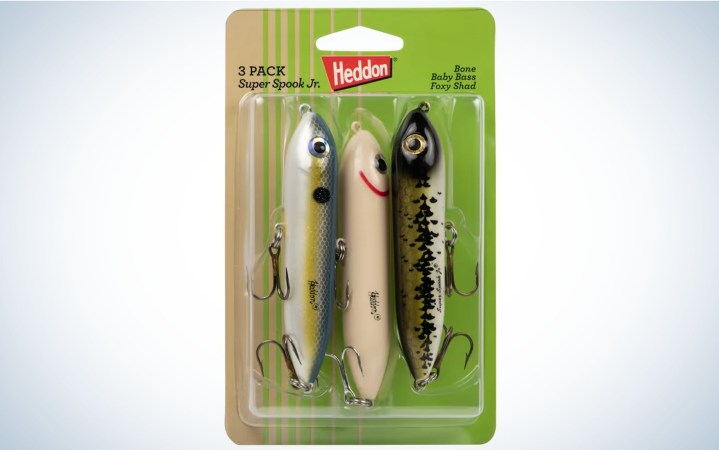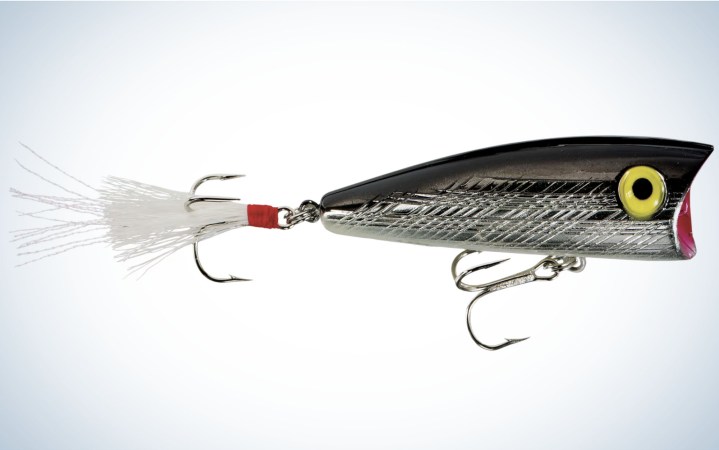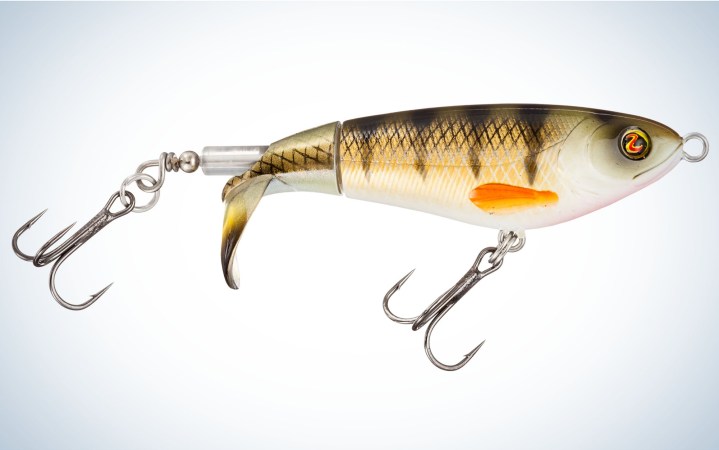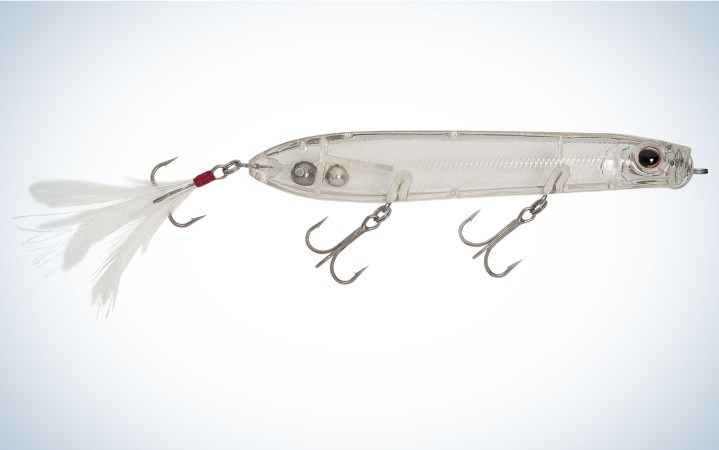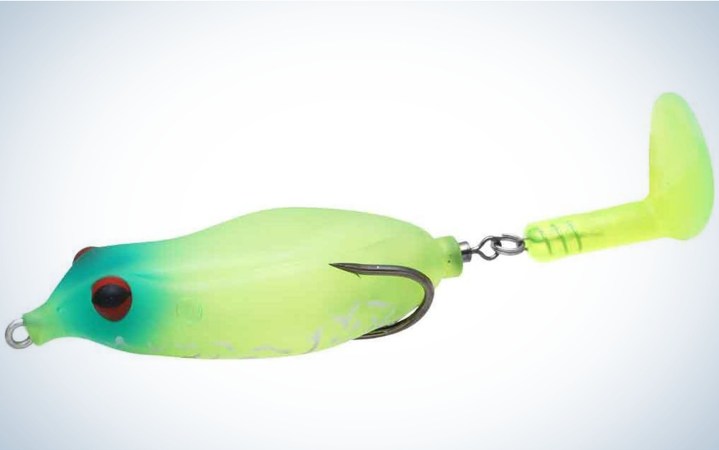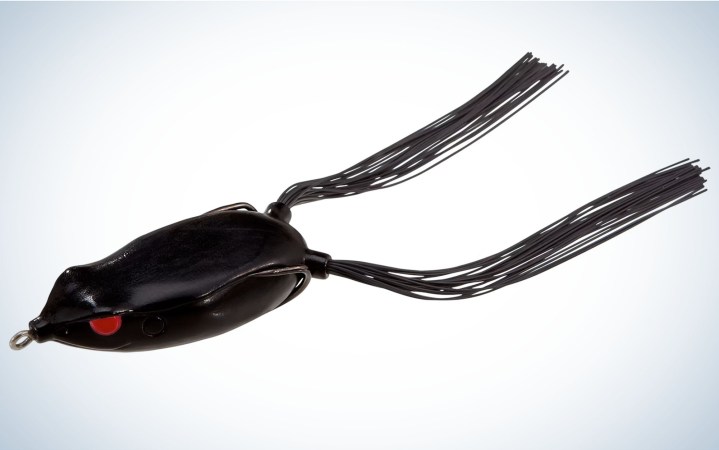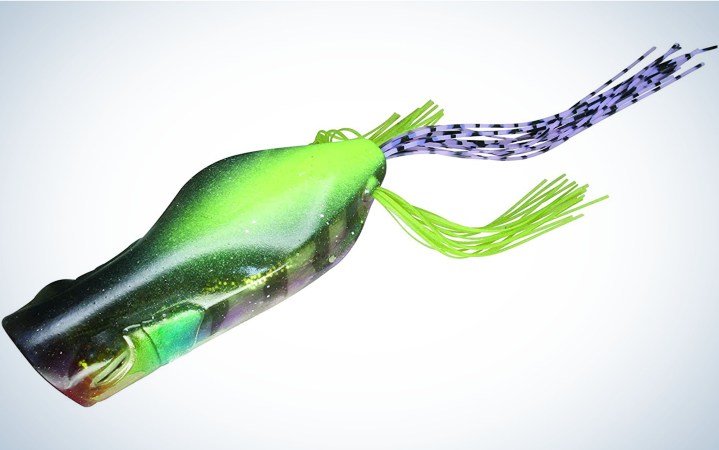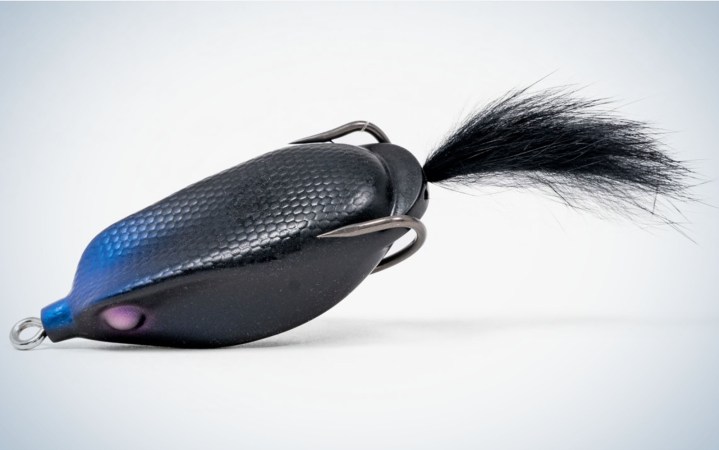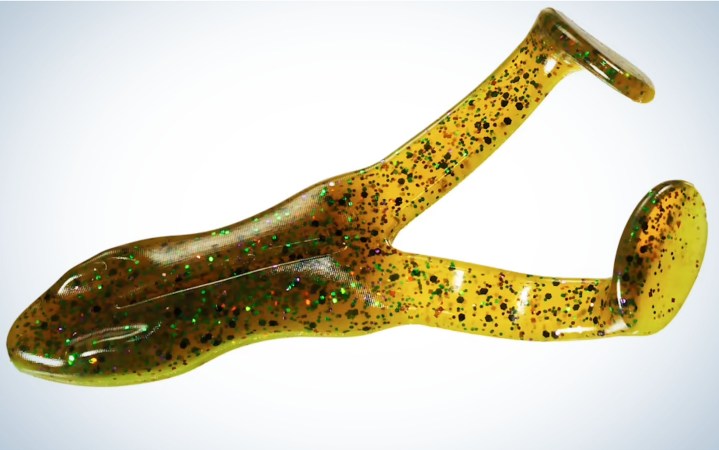We may earn revenue from the products available on this page and participate in affiliate programs. Learn More ›
It’s always special when a fish breaks the surface to inhale a topwater lure, but when it comes to freshwater bass fishing, it’s also a cultural phenomenon. Since the sport’s earliest days, bass anglers have consistently developed new and improved topwater lures to entice largemouth, smallmouth, and spotted bass. Catching one—or more—that way is of course exciting and rewarding, but most of all in the hands of a skilled angler, it’s a way to catch bigger fish consistently.
Over the years, we’ve seen the topwater windows expand from just spring-through-fall and low-light hours, to encompass more of the year and more of the day. While a topwater-only approach may be self-defeating at times, it’s also increasingly possible. From poppers to ploppers to frogs, there are both generalists and situationally-specific tools to catch more and bigger bass on top. Here are the best topwater lures for bass to catch Larry’s and bronzebacks.
- Best for Smallmouth: Heddon Super Spook Jr.
- Best Popper: Rebel Pop-R
- Best for Fall: River2Sea Whopper Plopper
- Best for Bass Chasing Herring: Evergreen Shower Blows Topwater Plugs
- Best for Covering Water: Teckel Sprinker
- Best Frog: SPRO Dean Rojas Bronzeye Frog
- Best Popping Frog: Jackall Gavacho
- Best Finesse Frog: Deps Slither K
- Best Toad: Stanley Ribbit
How I Chose the Best Topwater Lures for Bass
I’ve been fishing and covering professional bass fishing for decades, and I’ve seen all the gimmicks and the baits that consistently catch fish. My picks for the best topwater baits are all proven winners that work throughout the country and in a variety of situations. Their versatility makes them confidence baits you can tie on anytime bass are feeding in the upper water column.
The Best Topwater Lures for Bass: Reviews & Recommendations
Best for Smallmouth: Heddon Super Spook Jr.
Best for Smallmouth
Heddon Super Spook Jr.
Key Features
- Sizes: 3 ½ inches (1/2 oz), 5 inches (7/8 oz)
- Distinguishing characteristics: Cigar-shaped body with loud rattles
- Key colors: Bone, Black Shore Shad, Okie Shad
Pros
- Makes a lot of noise
- High-quality hooks
- Walks easily
- Broad range of colors
Cons
- Not the most natural body shape.
- Not necessarily the best choice on streams or the Great Lakes
There may be more modern and more natural-looking “walk the dog” topwaters, but this upgraded version of the original from Heddon is the best topwater smallmouth candy. It walks easily and calls big brown bass from a distance, or from the depths. They strike it extra hard, too, which means you’ll also need to invest in a quality pair of pliers to remove the premium Excalibur Rotating Treble Hooks.
There’s no more exciting way to catch a post-spawn bronzeback than with a topwater lure, and few surface tools have been getting the job done longer than Heddon’s Zara Spook. You can still use the original effectively, but this upgraded version, the Heddon Super Spook, has all of the extra bells and whistles to grab a few more bites and to keep them hooked up. The smaller “Junior” version is often smallie anglers’ first choice, but don’t hesitate to go to the five-incher, especially in wind and waves where you need to make a ruckus to grab their attention. It’s worth noting this isn’t just one of the best topwater lures for smallmouth bass, it’s also one of the best bass lures of all time.
Best Popper: Rebel Pop-R
Best Popper
Rebel Pop-R
Key Features
- Sizes: 2, 2 ½, and 3 inches
- Distinguishing Characteristics: Cupped mouth can be “blooped” or chugged
- Key Colors: Bone, silver/black, and Tennessee shad
Pros
- Casts well
- No wrong way to work it
- Calls bass from a distance
Cons
- Not ideal 12 months out of the year in most places
Rebel temporarily discontinued the Pop-R in the 1970s, until a group of Texas bass pros bought up all they could find—and started winning tournaments with them left and right — convinced them to bring the lure back. Nearly 50 years later it’s a stalwart, and while some purists modify them for particular uses, they’re deadly straight off the tackle store shelf.
While there are more modern and more refined poppers available, albeit, at a higher price point, the original Pop-R is still the standard for topwater poppers. You can throw it out, let the ripples dissipate, and then slowly pop it, or alternatively, you can skip it along the surface like a fast-fleeing shad. Anglers in Tennessee even pitch it into buck brush in places most of us would only throw a jig. When you get a strike, you’ll know it, because the waters often part in a biblical fashion. Just make sure you invest in a good set of long-nosed pliers because you’ll often find this hard topwater lure in the back of your fish’s throat.
Best for Fall: River2Sea Whopper Plopper
Best for Fall
River2Sea Whopper Plopper
Key Features
- Sizes: 60, 75, 90, 110, 130, 190 mm
- Distinguishing Characteristics: Rotating tail, borrowed from the musky world
- Key Colors: Loon, Powder Munky Butt
Pros
- Really fun to fish
- Wide color array
- Numerous sizes to match the mood of the fish
Cons
- Easy to stick with it too long when fish would prefer something else
Topwater fishing was already exciting enough, but the introduction of the River2Sea Whopper Plopper to the bass world less than a decade ago made it even more heart-stopping. Just by retrieving this lure at a steady pace, and perhaps occasionally adding a stop or stutter-step, anglers can generate strikes that you’d normally have to travel to the Amazon to experience. Amazingly, hookups are also typically rock solid.
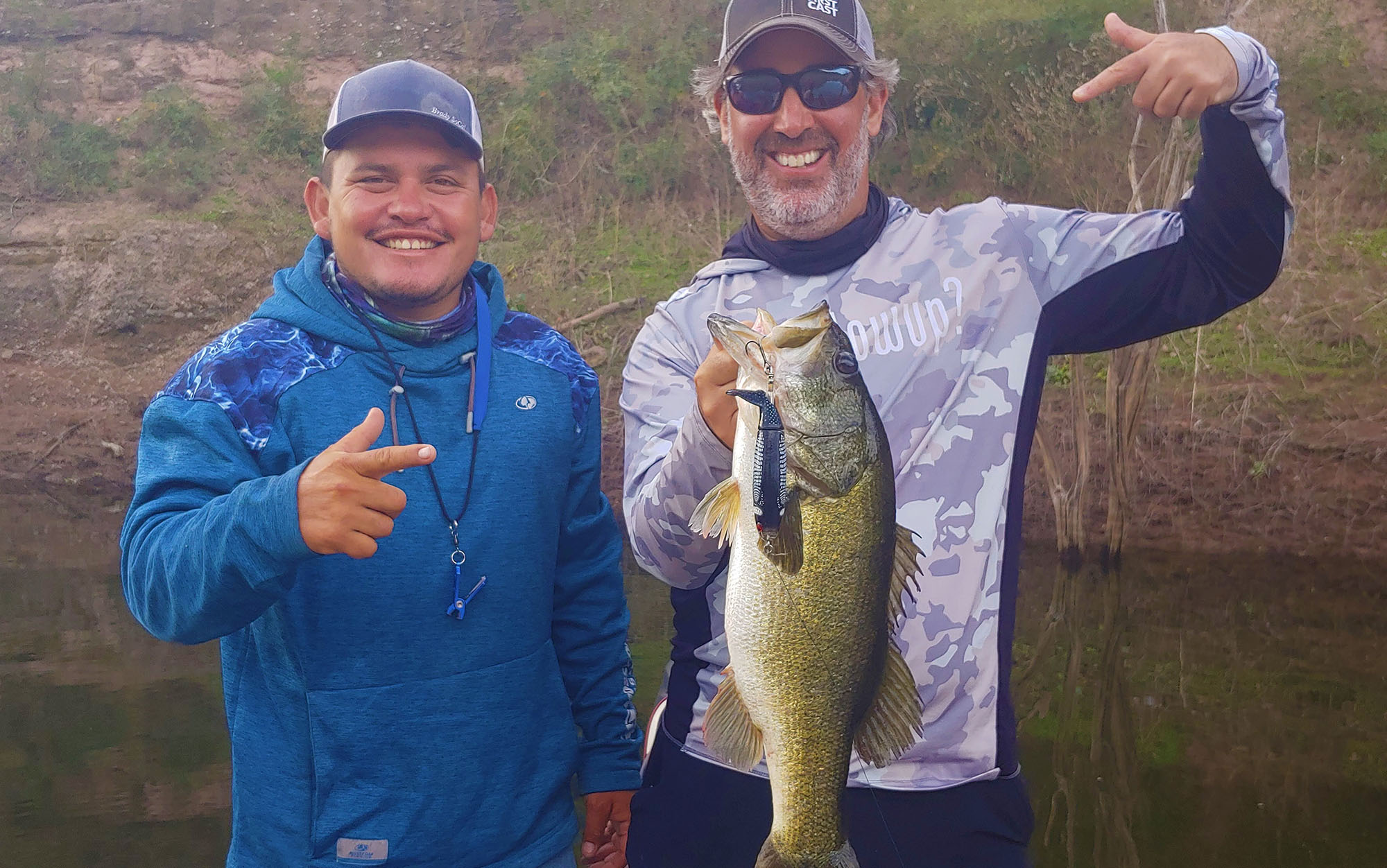
The Whopper Plopper combines a cigar-shaped body with a propeller tail. Does it represent a terrestrial animal? A frog? A baitfish? Who cares? It casts like a bullet, generates ridiculous strikes, and despite its gaudy footprint, it works surprisingly well on pressured fish. It can be worked at a snail’s crawl, you can burn it, or use any pace in between. Big fish especially seem to have a love-hate relationship with this lure, and even if they’re not in a feeding mood, they often strike it out of pure territoriality. In the smaller sizes, you’ll find it to be one of the best fall bass lures for ponds, especially ponds that haven’t been fished with a Whopper Plopper yet.
Learn everything you need to know about the Whopper Plopper in our full review and fishing guide.
Best for Bass Chasing Herring: Evergreen Shower Blows Topwater Plugs
Best for Bass Chasing Herring
Evergreen Shower Blows Topwater Plugs
Key Features
- Sizes: 77.7, 105, 125 and 150 millimeters
- Ultra-natural color selections for clear water
- Premium rear feather treble
Pros
- Larger sizes have three trebles to ensure maximum hookups
- Highly castable, yet buoyant
- Feathered rear treble attracts fish at rest
Cons
- Pricier than most U.S. domestic topwaters
Multiple topwaters in one package, the Shower Blows can be walked or popped, but it’s best when skittered at high speeds for bass chasing schooled-up baitfish. The Shower Blows is a 21st-century Japanese answer to the more primitive pencil poppers of the past, made with improved styling and components. While this style of lure is best known for their striper-tempting abilities, anglers in the Carolinas recognized that they’re also ideal for when largemouth and spotted bass are herding blueback herring. They can be cast a mile and retrieved at warp speeds without blowing out – while they can also be slowed down in the rare instances when fish strike and miss. There’s also a built-in tungsten weight system which helps casting distance and creates a fish-attracting knock for times when sight feeding alone is not the ticket.
Best for Covering Water: Teckel Sprinker
Best for Covering Water
Teckel Sprinker
Key Features
- Length: 3-inch body, and 4 inches with tail
- Weight: 5/8 ounce
- Flush-mounted double hook
- More than a dozen colors
Pros
- Built on Teckel’s narrow hollow body
- Tail spins at any speed
- Replacement tails available and easy to install
Cons
- Other options may be better for slow retrieves
Lure-building mastermind Hideki Maeda of Japan has long designed great innovations for other companies, but with his own company, he’s been able to let his frog obsession run free. The results have been phenomenal, with all sorts of noise making amphibians hitting the market for different circumstances. None of the others, however, have proven as popular (or have produced as many tournament big bass awards) as the Sprinker. It adds a tail like that found on a Whopper Plopper to the frog body. Reeled at any consistent speed, the tail rotates on a free-spinning swivel, and creates a sound that calls fish from afar.
When it first came out, and was in limited supply, covetous anglers were paying multiples of the MSRP to get one of the best topwater lures for bass, but now they’re readily available at market prices. The Teckel Sprinker is one of the easiest to fish effectively—just cast it out and reel it back—and while the plastic is soft it is also super-durable, so even after a lot of fish it continues to run true without taking on water.
One tip is to buy extra tails because short strikers will rip them off. Luckily, the replacements thread easily onto the screw lock for easy repair.
Best Frog: SPRO Dean Rojas Bronzeye Frog
Best Frog
SPRO Dean Rojas Bronzeye Frog
Key Features
- Lengths: 90 mm (3.5 inches), 65 mm (2.5 inches), and 60 mm (2.3 inches)
- Over 40 different colors from basics to forage-specific
- Soft, narrow body design
Pros
- Great range of colors
- Walks easily
- Skips well under overhanging cover
- High quality 2X Gamakatsu hooks
Cons
- After a number of fish sometimes takes on water
This is the frog that truly changed the game for the vast majority of bass anglers, and while SPRO has enhanced the line with popping versions and other noisemakers, if you’re only going to get one frog, this is the one. Everything about it is premium, from the extra-strong Gamakatsu double hook that stands up to your hardest braided line hook sets, to the line tie, which is welded closed so that your braid will never slip out.
The living rubber legs match the many colors and are left extra-long so that you can trim them to your liking—some anglers like them short or uneven for better walking abilities. Anglers just starting out should favor black, white, and maybe a frog pattern, but some of the all-time great colors from SPRO include Killer Gill, Nasty Shad, and Red Ear. With those, you’re not just limited to imitating frogs and toads, but also all manners of baitfish.
When you’re learning how to fish a frog bait, one of the first skills is walking a frog. Creating the enticing side-to-side dance is exceptionally easy with the SPRO Bronzeye, which makes it one of the best frog lures for beginners and seasoned pros.
Read more about the best frog lures in our full review.
Best Popping Frog: Jackall Gavacho
Best Popping Frog
Jackall Gavacho
Key Features
- Length: 2.75 inches
- Weight: ⅔ ounce
- Six colors
Pros
- Easy to work
- Casts a long distance
- Covers many situations
Cons
- Doesn’t come through cover as well as a walking frog
There aren’t many times I don’t have a Gavacho tied onto my line because there aren’t many situations where it doesn’t excel. If I’m fishing a pad field, I can bring the bait into an opening and walk it in place. If there’s some chop on the water, I can pop the frog. I have no problem quickly walking it down a weed edge. The only time it doesn’t shine is in really thick vegetation because the cupped face doesn’t come through cover as cleanly as the pointed head of a walking frog.
I also like that working the Gavacho takes very little effort, and the slim profile means I get more eats with fewer short strikes. The hooks on it are the right thickness, so they won’t bend out when you’re winching a fish from the slop, but they’re thin enough that they still penetrate easily. Another design feature that aids in hookup ratio is the soft body, which easily collapses and exposes the hooks making it one of best topwater lures for bass. —Scott Einsmann
Best Finesse Frog: Deps Slither K
Best Finesse Frog
Deps Slither K
Features
- Length: 2.25 inches
- Weight: 3/8 ounce
- Rabbit fur tail
- High quality double frog hook
- 12 colors
Pros
- Extra soft construction and superior engineering translate into high hookup percentage
- Easy to manipulate
- Despite being small, still heavy enough to cast into the wind
Cons
- Softness makes it less durable than some other frogs
Japan’s Deps is known for offering unique, premium products, and this little frog is just that. It’s small, but still packs enough of a profile and indentation on thick grass to attract attention. I was amazed at how easily it walked right out of the package, and while I’m used to silicone or rubber leg material, the rabbit fur is every bit as good. Even when the frog itself is sitting still, the tail continues to undulate and it doesn’t seem to mat up if put away wet. There are times when a standard-sized frog is too much for finicky fish, and that’s when you want the Slither K. This frog does cost a little bit more than some other models, but the performance is worth the price. If you like this line, you should also check out their Buster K popping frog.
Best Frog for Covering Water: Stanley Ribbit
Best Frog for Covering Water
Stanley Ribbit
Key Features
- Durable soft plastic construction
- 3.5-inch standard size (plus a larger “Bull” Ribbit)
- Stanley developed a double hook particularly for this body shape and size
Pros
- Easy to fish “correctly” – cast it out, reel it back steadily
- Incredibly weedless
- Huge color selection
Cons
- On some days the hookup percentage can be low
The OG buzz toad still calls bass out from beneath the greenery and had just the right sound to provoke huge explosions. There are now lots of buzz toads on the market, but when the Ribbit first came out it was one of the few – and it nevertheless remains among the most beloved and most versatile. That’s because the boot-shaped tails can be made to gurgle in all sorts of seductive ways, from a steady pitter-patter to a hard-charging thump. Stanley has also taken the time to maximize their color selection, so whether you’re just trying to emulate amphibians or you want to replicate a bluegill, crappie, insect, or some other sort of forage, there’s a match for that situation. It’s big enough to take a variety of hooks, and slips over and through cover with ease, making it a true 4WD bass assassin.
How to Choose the Best Topwater Lure for Bass
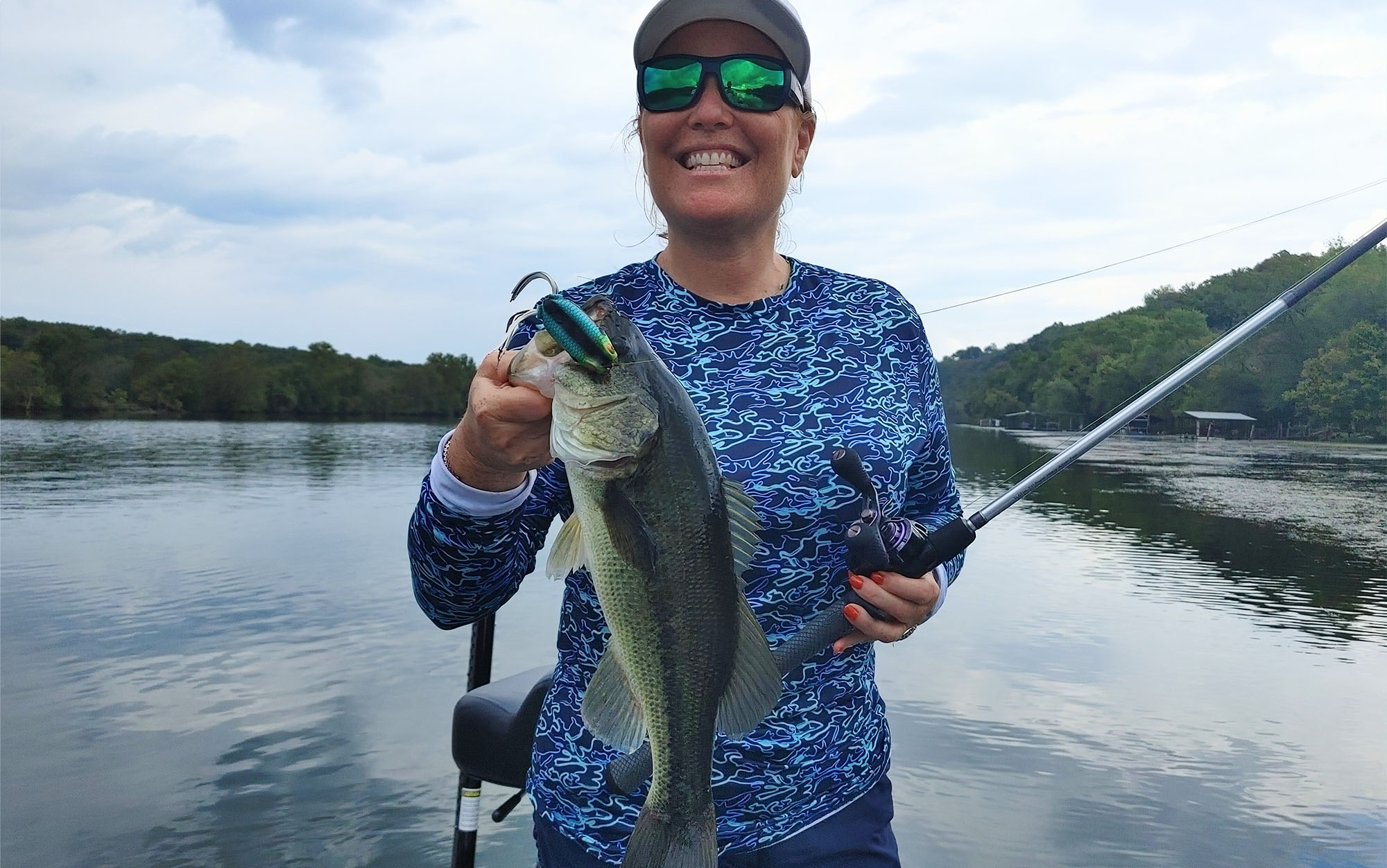
Cover
While a three-hooked walking bait or two treble popper may have the best hookup percentages in open water, anglers who try to fish them through tangled laydowns or matted grass will spend more time cursing that choice than reeling in fish. In the same places where a Zara Spook or Whopper Plopper might work if the vegetation was slightly thinner, a buzzbait may be a better choice. Similarly, if the grass is even too thick for that single-hooked option, a hollow bodied frog or buzz toad can go four wheeling with ease – and extract the bass that live there.
Movement
Are bass keyed in on mobile forage or are they relating to solitary pieces of cover? Is your intent to call them from a distance or from the depths, or do you have them targeted. A buzzbait or a hard-walking cigar-shaped lure can bring fish from afar, but If you suspect that there’s a resident by a stump you might choose an option – such as a popper – that continues to operate and attract even when left at rest. The buzzbait, for example, will just sink lifelessly if stopped, while the pulsing feather of a rear treble will continue to exercise attraction.
Noise
It takes a certain level of aggression for a bass to attack a surface lure, but sometimes noise is a feature and sometimes it’s a bug. A gurgling or popping or buzzing lure, or even one with a rattle inside, can call fish from a distance. On the flip side, if you’re aiming for a reaction bite, it can also give them fair warning, a possible turnoff. Experiment with different noise profiles if you’re not getting enough strikes, or if the ones that you’re getting are halfhearted.
Forage Size
If the bass aren’t of a certain size, or what they’re eating is smaller-than-average, then anglers need to find downsized versions of their favorites. Fortunately, some proven winners like the Whopper Plopper come from 2-inches all the way up to musky-sized. Choose based on the factors in play.
Forage Color
Topwaters, whether made of soft plastic, hard plastic, wood or skirted material, can be colored to look like anything, from shad to bluegills to amphibians to terrestrials. It pays to “match the hatch” although there’s an ongoing debate about whether the entire lure matters or just the belly. Either way, remember that water clarity and sky conditions will impact how a “perfect” color is perceived.
FAQs
Black, white, shad, and bluegill are common color patterns that catch fish throughout the country. Use darker colors in dark water, lighter colors in clear water, and forage-specific colors when bass are keyed on a specific food source.
Bass eat topwater baits from spring through fall.
Mono floats and is often the best choice for topwater baits. The exception is frogs, where heavy braid is the best option.
Why Trust Outdoor Life?
Since 1898, OL has been a leading authority in testing and reviewing hunting gear, fishing tackle, guns and shooting equipment, and much more. We have more than a century-long history of evaluating products, and we’re now bringing that expertise to online reviews. Our editors are experienced outdoorsmen and women, and most importantly, we’re trained journalists. We prioritize field testing and objective data when reviewing products. We conduct interviews with gear manufacturers and engineers as well as outdoor experts so that our readers have an understanding of how and why a product works—or doesn’t.
Advertising does not influence our gear reviews and it never will. While we always focus our coverage on standout products—because we want our readers to be aware of the latest and greatest gear—we also cover the flaws and quirks of any given product.
Final Thoughts
A Ned rig will put a bunch of bass in the boat, but it’s nowhere near as much fun as the heart-stopping blowup you get while fishing the best topwater lures for bass. Topwaters, especially frogs, can produce giant bass in places other lures struggle. If you want to have fun and catch fish the year, try one of my recommended topwaters.
- Best for Smallmouth: Heddon Super Spook Jr.
- Best Popper: Rebel Pop-R
- Best for Fall: River2Sea Whopper Plopper
- Best for Bass Chasing Herring: Evergreen Shower Blows Topwater Plugs
- Best for Covering Water: Teckel Sprinker
- Best Frog: SPRO Dean Rojas Bronzeye Frog
- Best Popping Frog: Jackall Gavacho
- Best Finesse Frog: Deps Slither K
- Best Toad: Stanley Ribbit
